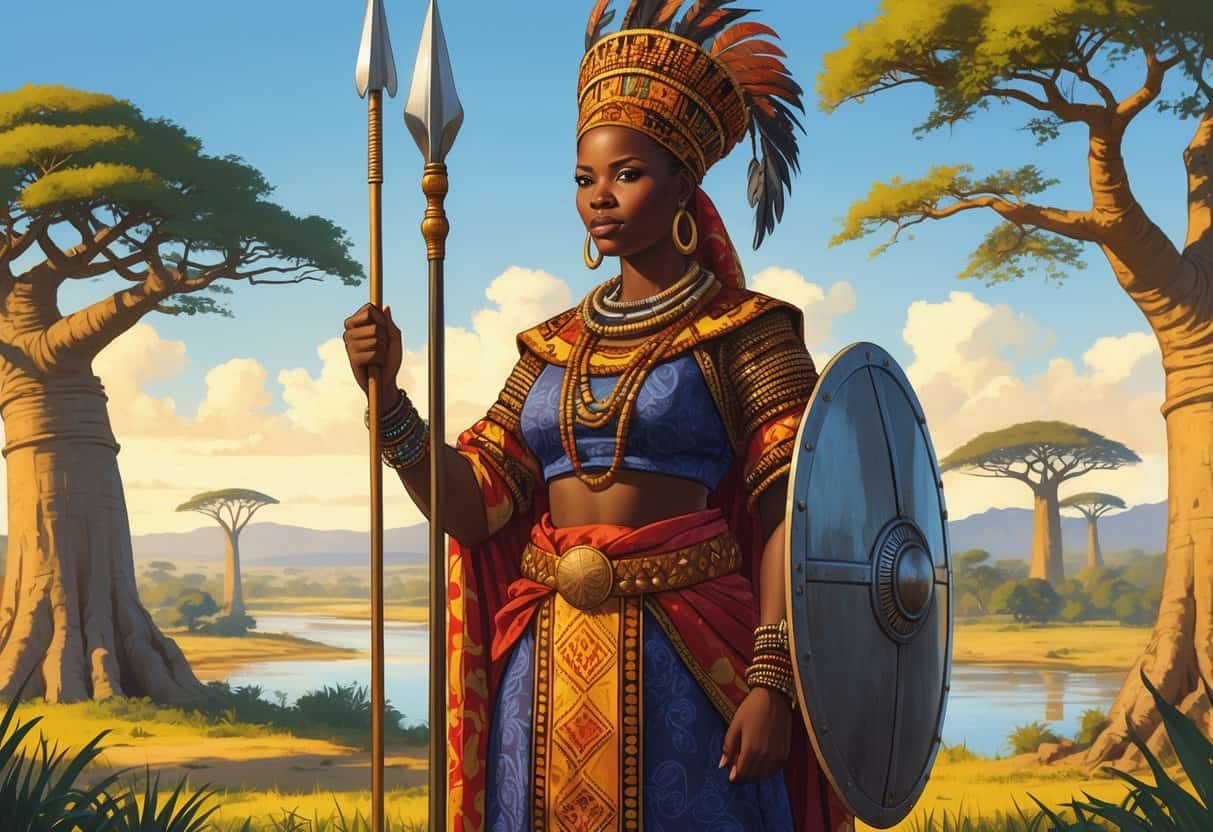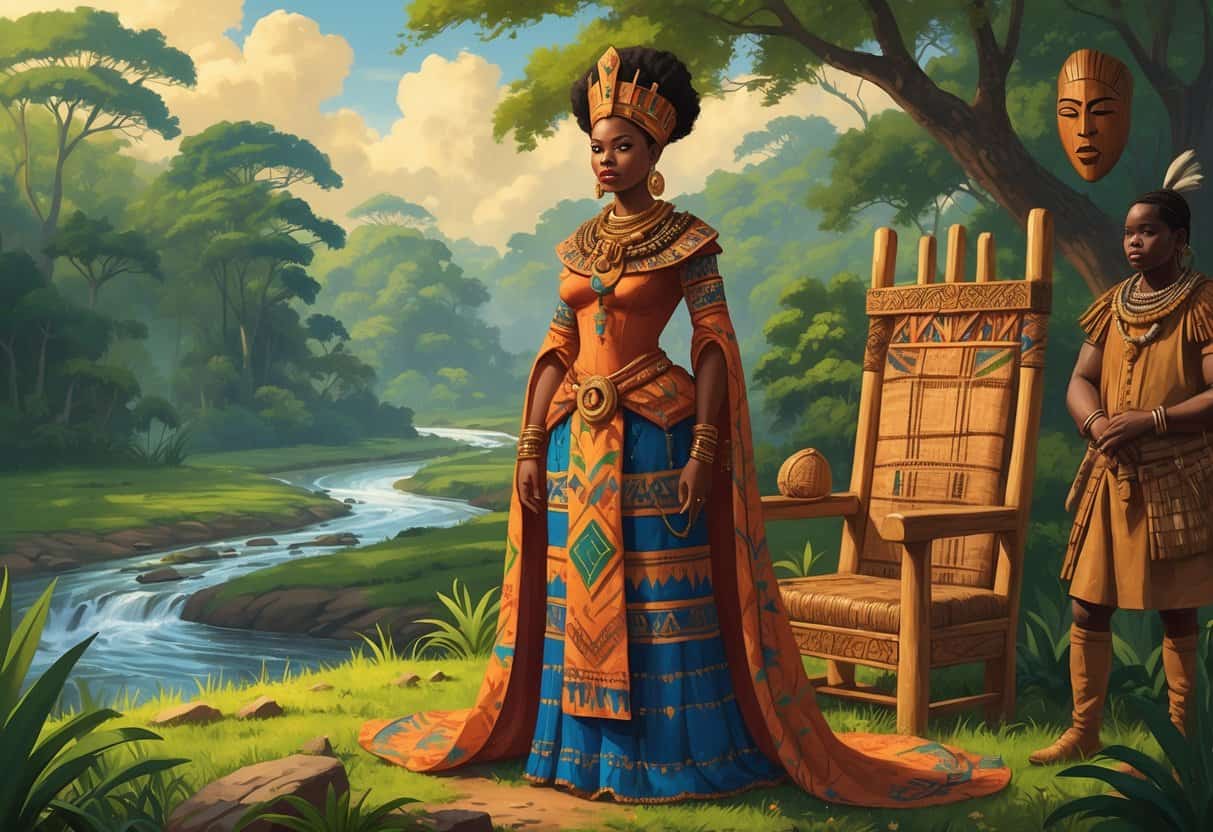Queen Nzinga led the kingdoms of Ndongo and Matamba, in what’s now Angola.
She’s remembered for her fierce resistance against Portuguese colonization and the slave trade in the 1600s. Her leadership was marked by sharp intelligence and guts, especially during tough times for her people.

Nzinga used both diplomacy and military skill to defend her kingdom. She built alliances and led her people with a kind of courage that’s honestly rare.
If you want a glimpse into African history and what it means to fight back against European expansion, Nzinga’s story is a good place to start.
Key Takeways
- Nzinga became queen and led Ndongo during a time of conflict.
- She used smart tactics to resist Portuguese control.
- Her legacy remains important in African history.
Early Life and Rise to Power

Nzinga Mbandi’s family roots set the stage for her future as a leader in African politics.
Her life is honestly a story of courage and skill in a world that didn’t make it easy for women to lead.
Family Background
Nzinga Mbandi was born in 1583 into the royal family of the Mbundu people, in what’s now Angola.
Her father was king, so she had access to education and learned about politics early on.
She grew up surrounded by the customs and traditions of her people.
Nzinga watched her family handle both local matters and tricky relations with the Portuguese, who were starting to push into the region.
All of this shaped how she saw leadership and diplomacy.
Path to Leadership
When Nzinga’s brother died, she became ruler of Ndongo in 1624.
That was pretty unusual, since most African politics at the time favored men.
Nzinga proved herself—she used intelligence and guts to strengthen her position.
She faced threats from the Portuguese and from rivals inside her own kingdom.
Nzinga built alliances and led armies, always focused on protecting Ndongo’s independence.
Her rise was marked by bold decisions that earned her respect as a queen and a symbol of resistance.
Reign and Political Influence
Queen Nzinga ruled two kingdoms, pushed back against Portuguese slave traders, and left her mark on African politics.
Her leadership shaped the history of Angola and had a ripple effect on resistance to European colonization.
Rule Over Ndongo and Matamba
Nzinga became ruler of Ndongo in 1624, after her brother’s death.
Ndongo was in what’s now Angola, mostly home to the Mbundu people.
Later, she also took charge of the neighboring kingdom of Matamba.
Nzinga moved her capital to Matamba to boost her power.
She worked to unite her people during a time full of conflict and pressure from Europeans.
People respected her because she could fight and negotiate—she was just as comfortable at the table as she was on the battlefield.
By ruling both states, Nzinga expanded her influence in West Africa.
She kept African traditions alive but also adapted when Portuguese threats forced her hand.
Strategies Against Portuguese Slave Traders
Nzinga fought hard against Portuguese slave traders who wanted to control her lands and capture people for slavery.
To resist, she built alliances with neighboring groups and even teamed up with the Dutch to challenge the Portuguese.
She used both war and clever negotiations to keep her kingdoms independent.
Nzinga didn’t just fight—she borrowed Portuguese customs when it worked to her advantage, outsmarting her enemies more than once.
Her refusal to accept Portuguese demands made her a leading figure in the fight against European colonization.
Legacy in African Politics
Nzinga’s legacy lives on in how she inspired future leaders across Africa.
Her resistance showed that local rulers didn’t have to just fold under European pressure during the slave trade era.
In Angola and beyond, Nzinga is still a symbol of strength and political skill.
She balanced war, diplomacy, and cultural preservation in a way that’s honestly impressive.
Her story shines a light on the complicated politics in West Africa during the 17th century.
Legacy and Historical Significance
Queen Nzinga’s leadership changed the direction of her people’s history.
Her actions showed what strong resistance against foreign control could look like.
Symbol of Resistance and Courage
Queen Nzinga stands out as a symbol of resistance.
She fought Portuguese forces who tried to take her kingdom and enslave her people.
Nzinga used smart strategies and gutsy diplomacy to defend Ndongo and Matamba.
Her courage inspired others to stand up to colonizers, even when it seemed impossible.
She’s a lasting figure of strength in African history—a reminder that fighting for freedom and justice takes boldness and sharp leadership.
Impact on Modern Angola
Nzinga’s story shapes how you understand Angola today. She’s celebrated as a national hero who fought for sovereignty and held onto African culture during European expansion.
In Angola, schools and monuments honor her legacy. You’ll spot her name tied to pride and identity throughout Angolan history.
Her ability to unite different groups in Matamba under her rule shows how leadership can bring people together in tough times. It’s honestly hard not to admire that.